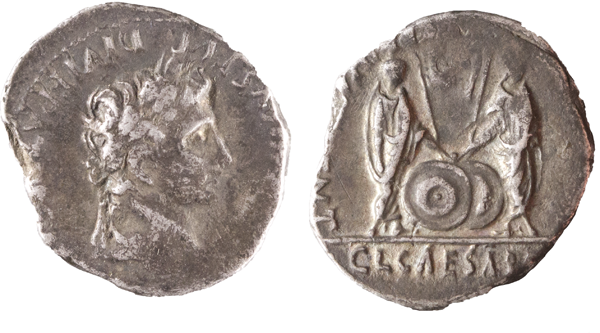
January 16, 2015, by Esther Eidinow
Res publica restituta?
As part of the Nottingham ‘Anniversaries through Coins’ project, Matthew Myers describes how on this day, the 16th January in 27 BC, Octavian became Augustus.
Following the defeat of his former ally Marc Antony and the Egyptian queen Cleopatra at the battle of Actium in 31 BC, Octavian emerged as the victor of civil war and the unchallenged master of the Roman world. Yet now that peace had been restored Octavian was faced with a dilemma. If he stepped down, it would only be a matter of time before Rome was again plunged into civil war. However, to openly retain his autocratic power in a time of peace would be to risk the same fate as his great-uncle, Julius Caesar. A compromise had to be found.
Thus, on 13th January 27 BC Octavian suddenly renounced all of his powers and handed his provinces over to the Senate and the Roman People. After this decision was greeted with cries of protest from the senators, Octavian agreed to undertake the administration of the provinces of Spain, Gaul, and Syria, for a fixed period of ten years – an event which has since come to be known as the First Augustan Settlement.
Three days later, on 16th January, the Senate, eager to express their gratitude, voted a number of honours for Octavian. A laurel wreath was placed on his door, in recognition of his position as saviour of the Roman state, and a golden shield was erected in the Senate house in honour of his ‘virtue, clemency, justice, and piety’. Finally, and most significantly, the name Augustus, a title with religious overtones meaning ‘venerable one’, was conferred upon him, as well as the title princeps, meaning ‘first-citizen’.
Octavian initially preferred the name Romulus, after the mythical king and founder of the city, but eventually decided against it to avoid appearing as if he desired to be king himself. Augustus was agreed upon as being both more original and more honourable, stemming from the adjective used to refer to sacred sites. In addition to the name’s religious connotations, it also shared a root with the Latin noun auctoritas, an important concept in Roman society which loosely translates as authority, power, or prestige. Thus, in the name Augustus, Octavian received confirmation of both his unofficial religious and political superiority, even as he ceded his official powers.
On the surface, the Roman constitution had been reinstated. Octavian had become Augustus in recognition of his services to the state, but in theory held no more power than other high ranking officials. Indeed, coinage of the period proclaims res publica restituta or res publica reddita, the Republic restored, and Augustus himself claims in his Res Gestae that he had restored the Republic and no longer held power beyond that of any other magistrate (34).
Yet the reality differed from the theory. While constitutionally his power was no different to that of any other proconsular provincial governor, his province was vast, encompassing the entirety of Spain, Gaul, and Syria, three of the most powerful military territories and home to the majority of the legions. By removing the powerful governors of these provinces and replacing them with his own legates, Augustus removed potential rivals for power and secured political primacy by virtue of his control of the legions. Additionally, Augustus’ abstract, unofficial political authority and prestige (his auctoritas) allowed him to hold the consulship, Rome’s highest office, continually until 23 BC, thus allowing him to control the direction of senatorial debate and public policy.
Officially, Octavian became Augustus as the result of his restoration of power to the Senate. In reality, this idea became harder and harder to reconcile with the realities of imperial rule, as Augustus consolidated more and more constitutional powers in the years following 27 BC. In claiming to have restored the Republic and lay down his powers, Augustus in fact did the opposite and founded the Roman Empire, a system of one-man rule that would endure in the West for the next 500 years.
Image by Kelly Grimshaw: AR denarius of Augustus. Obverse laureate head of Augustus right; [CAESAR AVGV]STVS DIVI F PATER PAT[RIAE]. Reverse has Augustus’ grandchildren Gaius and Lucius balanced, with shields and spears; [AVGVSTI F COS DESIG PRINC IV]VENT, C L CAESARES in ex.. 3.62g, 18mm.
Coin courtesy of The University of Nottingham Museum.
No comments yet, fill out a comment to be the first

Leave a Reply